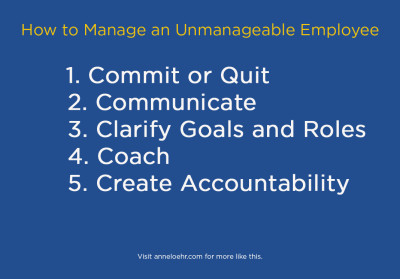There sure are a lot of different personalities in the workplace. As a manager, you have to work with diverse personae on an even closer level. And let's face it, some of those characters are difficult to deal with. Some may even seem, ahem, unmanageable.
To help busy managers deal with the seemingly "unmanageables," Jezra Kaye and I wrote Managing the Unmanageable: How to Motivate Even the Most Unruly Employee. In the book, we cover how to effectively manage many of the common unmanageable employees (UE's).
Do any of these employees sound familiar?
Meet the Unmanageables
The AWOL: If your employee is often late, disappears, no-shows or "just" neglects an important duty, you've got yourself an AWOL. Typically, when someone goes AWOL, his work piles up, deadlines are missed, and important messages go unanswered. And the AWOL creates constant low-grade tension, because everyone knows that somebody's going to have to cover for him, yet again.
The Egomaniac: If you've worked with an egomaniac, you may have heard the words 'me me me me me me me.' This UE takes the phrase "not a team player" to new heights. A healthy ego can be a good thing, but the same ego that drives an Egomaniac to succeed can drive her colleagues to distraction. And worse, the Egomaniac doesn't just think about herself all the time; she seems to be out for herself all the time, too.
The Excuse Maker: One key element to this UE is that nothing is ever his fault. How is that possible? Well, nothing can possibly be his fault because it's his colleague's fault, the client's fault and sometimes -- it's your fault. Even inanimate objects like computers and printers can take the blame.
The Grumbler: It's hard to cope with The Grumbler in an office environment -- or anywhere, really. Grumblers complain, complain, and complain until the entire team's enthusiasm is as good as gone. It's not just enthusiasm they squash. Good ideas don't have much of a chance of survival with their constant negative feedback.
The Rude-nik: While The Rude-nik thinks he's just being assertive, you couldn't prove it from the people he works with. Name calling, hissy fits, raised voices, and sudden mood swings are just some of the gifts he shares with others in the workplace -- all in the name of "doing his job."
The Loose Cannon: Ever worked with someone who spends all of her time loudly disagreeing with and challenging the organization's goals? This person knows better than anyone what is best for the organization and any alternative ideas are absolutely wrong. The fact that she's often a star performer makes it even more difficult to rein her in. This one is going to take some work.
The Joker: Humor is an important thing to keep in your organization. It's good for morale, engagement and relationship building. However, when that humor spills too heavily over into client relationships, you may have a problem on your hands. The Joker may come off as cavalier and make clients uncomfortable. So even though you may love this UE, you've got to do something if he starts driving clients away. Otherwise, the joke's on you and your bottom-line.
The Wallflower: It's difficult to tell whether The Wallflower is extremely insecure, extremely shy, or just not interested in taking on too much responsibility. You may find her huddled in her cubical during the day, or spot her sitting alone eating lunch far away from any other human beings. Unfortunately, this type of UE also doesn't volunteer for anything, won't build relationships with teammates, and when it comes to confrontation, she may as well be Casper.
The Gossip: This lovely professional is also a professional trash talker. A self-sustaining rumor mill, he knows exactly what to say and to whom, in order to create the most drama. Oddly, these people are often the most inviting to new teammates in the organization. They make fast friends with their colleagues and are extremely friendly with managers. If suddenly your team has turned into a passive or aggressive battleground, look for The Gossip.
The Slacker: Sometimes a great employee transforms into The Slacker. You know this person isn't lazy, but she starts showing up late, phoning in assignments, and in general dodging responsibility with glazed-over eyes. As a manager, it's your responsibility to get this person back on track, and it's going to take more than a few shots of espresso.
What do we do with these people? How can they truly be managed? You can start by consulting the "5C's" that Jezra and I created.
Use the 5C's As Your Guide to Managing the Unmanageables
- First, you need to COMMIT OR QUIT. Do you want to retain this employee? If you are going to take on that challenge, rather than the challenge of hiring someone new, you need to commit to managing this person in a new way. Yes, this may mean committing to the future of someone you may not even like.
Am I missing anyone? Have you tried any of these methods and met success? Let's compare notes. UE's, let us know what makes you even more unmanageable! Leave a comment below, or find me on Twitter.

